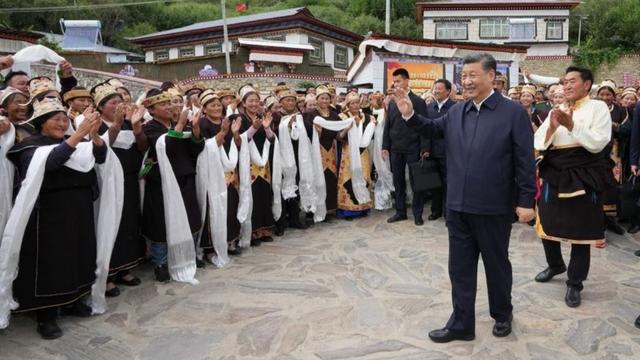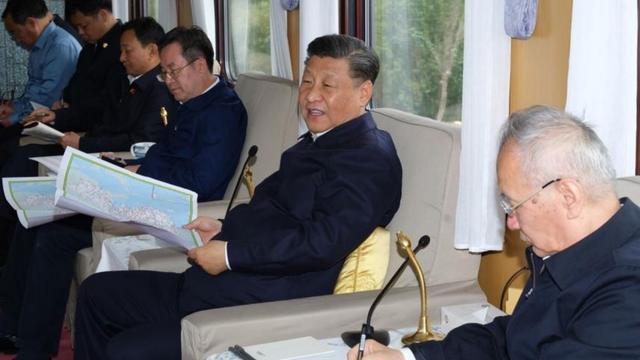The Chinese President’s attitude to Tibetan Buddhism can be read in his actions before the 20th Congress: monks, nuns, and activists arrested, monasteries destroyed, surveillance intensified.
by Choden Dolma

A Tibetan man named Lotse was arrested and taken from his home in Sêrxü County in Garzê Tibetan Autonomous Prefecture in Sichuan province just for operating an “illegal” WeChat group created for the anniversary of His Holiness the 14th Dalai Lama. It was just another confirmation of the level of Chinese repression of Tibetan culture and religion. The same is happening for Muslim Turkic culture in East Turkestan (Ch. Xinjiang) and for Mongolian Buddhist culture in Southern Mongolia (Ch. Inner Mongolia).
Repressing non-Han minorities has always been part of Chinese attitudes, but the government in Beijing has practiced it with more arrogance in the 21st century, as it regards itself as an untouchable superpower.
Now, it is expected that Xi Jinping will consolidate his supremacy through an unprecedented election for a third term as Chinese President this fall. What consequences will this have for Tibetans? Many of them believe their situation will go from bad to worse.
China should face low economic growth rate, a confrontation with the USA and the Western world about Ukraine, and a crisis in the South China Seas. Xi Jinping has always reacted to crises with a more assertive policy in controlling China’s territory. His recent unannounced visit to East Turkestan looks similar to his unannounced visit to Tibet last year. These are not just sideshows.
Xi inspects and controls how what he regards as his magnum opus, “Socialism with Chinese Characteristics,” is implemented in regions with a significant non-Han presence. Xi requests a total control by the CCP of the occupied regions that are now known as autonomous regions, prefectures, and counties. Hence, Tibet along with East Turkestan and several other “autonomous” entities in CCP-governed China find themselves in the firing lines.
Historically, Tibet provided refuge to Chinese Buddhist scholars when they were ostracized by Chinese emperors. Now, Tibet itself is ostracized by the Chinese Communist regime. Initially, it annexed Tibet’s territory. Now, it is eliminating the very soul and essence of Tibetan identity, which is Tibetan Buddhism. Chairman Mao once told the 14th Dalai Lama that “religion is poison.” Mao’s successors may not state it so explicitly, but it continues to be their basis for dealing with Tibetan Buddhism.
When they entered Tibet, Chinese Communists promised not to interfere with the autonomy of monastic institutions nor to collect taxation from them. However, things changed for the worst after the signing of the 1951 Seventeen Point Agreement and the subsequent exodus of Tibetans in 1959, which included the 14th Dalai Lama and many leaders of the Tibetan government. The Chinese then adopted a full-frontal assault to Tibetan Buddhism, whose climax was reached during the Cultural Revolution.
This dark period in Tibetan history saw the largest destruction of religious structures, the arrest of several high lamas, and a ban of Buddhism and other religious practices. Despite the fact that he had tried to accommodate the Chinese, he 10th Panchen Lama was not only arrested but had to undergo public struggle/denouncing sessions like many other high lamas and individuals who were deemed to be a threat to the Chinese project in Tibet.
Though there was some respite during Deng Xiaoping’s leadership, Beijing continued to look at Tibetan Buddhism with distrust and suspicion. According to several scholars, the 1987 Lhasa riots where Tibetan monks led the protest inspired in their own way the 1989 Tiananmen Square events (and its consequent massacre).
These events persuaded the CCP that a further crackdown on Tibetan Buddhism was needed. In 1995, the Chinese “disappeared” the legitimate 11th Panchen Lama recognized by the Dalai Lama, and appointed a 11th Panchen Lama of their own. In 2007, Beijing issued the State Religious Affairs Bureau Order No. 5 called “Measures on the Management of the Reincarnation of Living Buddhas in Tibetan Buddhism.”
This order was enacted on July 13, 2007, and implemented since September 1, 2007. It states that a reincarnation application must be filed by all Buddhist organizations and temples in China before they are allowed to recognize individuals as tulkus (reincarnated lamas). Giving to an atheistic party the power to control reincarnation, Order no. 5 added insult to injury for the Tibetans.

The repressive apparatus was well in place before Xi Jinping. What did Xi add to the predicament of Tibetans? The answer is, technology. Under Xi Jinping, high-end technologies are being used to monitor all Tibetan activities, especially those pertaining to Tibetan Buddhism. Chinese tech giants like Tencent Holding Limited have developed new tools for personal surveillance. Tibetan Buddhists had themselves used new technologies to disseminate their religion, but the surveillance power deployed under Xi Jinping makes this increasingly difficult. Any Tibetan activity on WeChat and other platforms the CCP does not like is immediately detected and punished. As Bitter Winter has reported, Tibetan monks are also increasingly prevented from preaching in other areas of China.
Chinese propaganda sometimes argues that as Tibetan economy and society evolves from “Medieval” to “modern,” it is not surprising that religion declines. That this is just propaganda is proved by the fact that outside Chinese borders, in the exile and the diaspora, Tibetan Buddhism is flourishing. It would continue to flourish in Tibet too, and in areas of historical Tibet outside Tibet Autonomous Region (where monasteries or parts of monasteries are now destroyed), if religious liberty was granted.
What can we as Tibetans expect from Xi Jinping’s third term? The answer is in the facts. In the months leading to the 20th Congress of the CCP, which opens on October 16, monks and nuns are “reeducated,” those who try to spread Buddhism online are arrested and sentenced, monasteries are destroyed, Tibetan teachers are prevented from teaching outside Tibet, and all Tibetan Buddhist life including reincarnation is tightly controlled. The stronger Xi Jinping will be, the more he will crack down on Tibetan identity, culture, and religion. Tibetans will not celebrate his “historical” re-election.











Toa Maoni Yako:
0 comments so far,add yours
Hii ni Blog ya Watanzania popote walipo duniani kwa ajili ya kuhabarisha, kutoa/kupokea taarifa na kuelimisha mambo yote yaliyo chanya kwa Taifa letu. Tafadhali sana unapotoa maoni usichafue hali ya hewa wala usijeruhi hisia za mtu/watu. Kuwa mstaarabu...